Digestive Health Guide and Supplements 2024
4th Mar 2024
Ultimate Guide to Digestive Health and Digestive Supplements
The gut contains over 100 trillion microorganisms, which creates a large microbiome that helps our body break down food and absorb nutrients. The gut is incredibly important as it can affect other aspects of our health, so maintaining our gastrointestinal (GI) health is crucial.
This guide will go through different areas of our digestive health, touching on topics like:
- Some Quick Digestive Health Facts
- What is Digestion?
- What are Digestive Enzymes?
- Why is the Gut So Important?
- Digestive Health Issues
- How To Improve Gut Health
- Minerals and Vitamins for Digestion and Metabolism
- List of Digestive Health Foods
- Best Digestive Health Supplements 2024
- Supplements that Cause Stomach Pain
- FAQs
Some Quick Digestive Health Facts
- Your digestive system has its own nervous system called the enteric nervous system.
- Your small intestine is longer than your large intestine.
- Emotions and brain disorders can affect your digestive system due to the gut-brain axis.
- Exercise can help with digestion.
- Gas can smell bad due to a fermented bacteria that reacts when mixed with air.
- When our stomach growls, it’s called borborygmic and actually happens regularly but is only audible when your stomach is empty as there’s no food to muffle it.
- The stomach can stretch and hold up to 4 pounds (1.8kg) at a time.
- We don’t have any healthy bacteria to digest food when we’re born.
- The reason we produce so much saliva when we throw up is to protect our teeth from the stomach acid that comes up.
- Burping occurs when we need to release the extra air that comes in when we eat fast, smoke or drink carbonated drinks.
What is Digestion?
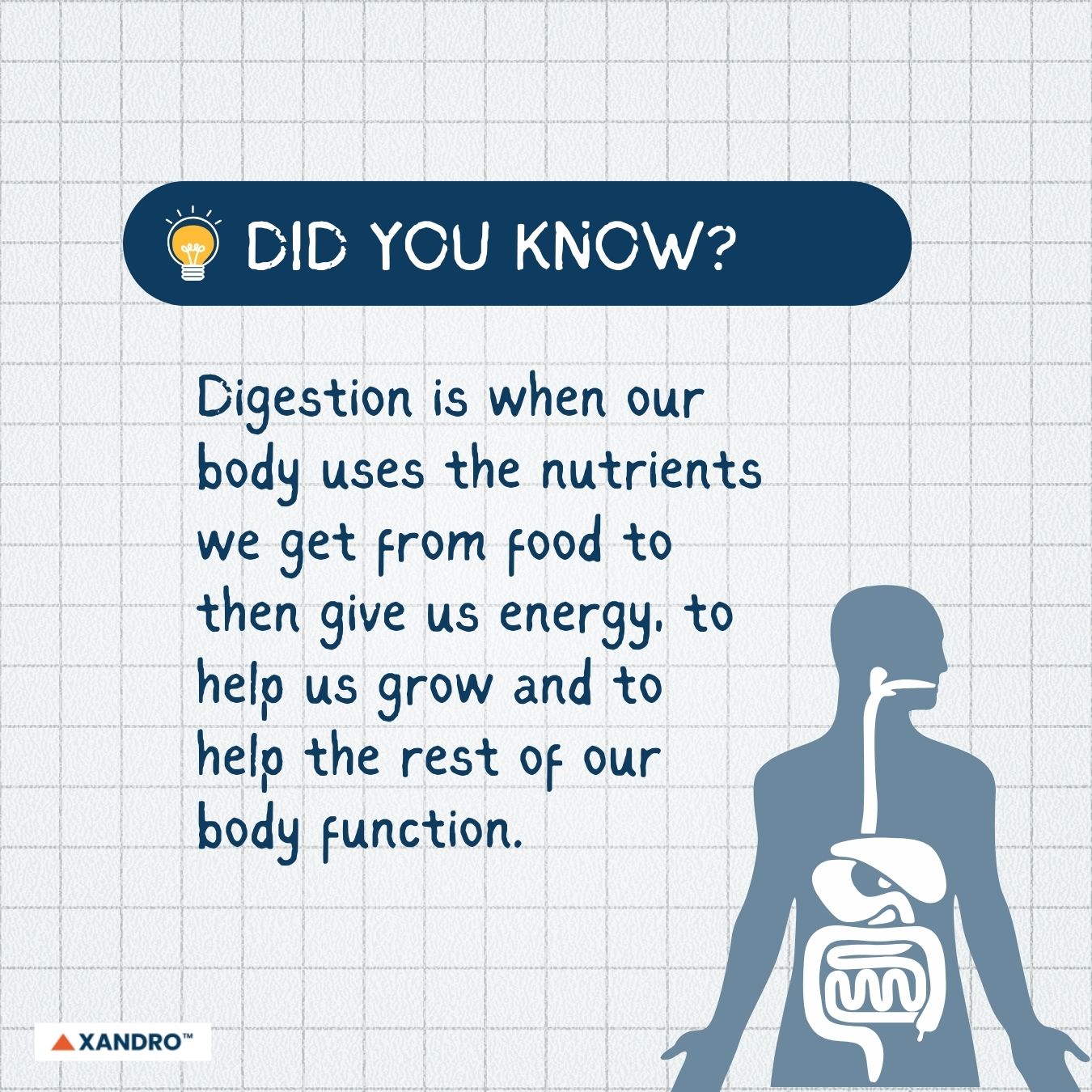
Digestion is the process where our bodies use the nutrients found in food to give us energy and help us grow and function properly. It begins in the mouth, where our saliva starts to break down food into a form that can be absorbed by our body.
Throughout the digestive process, enzymes are released, with our stomach, small intestine and pancreas all making digestive enzymes. The pancreas produces the most important digestive enzymes, which break down carbohydrates, proteins and fats.
Digestive enzymes are proteins that your body makes to help break down food and help with digestion.
There are many types of digestive enzymes, such as:
- Amylase: breaks down complex carbohydrates
- Lipase: breaks down fats
- Protease: breaks down proteins
- Lactase: breaks down lactose
- Sucrase: breaks down sucrose
If you don’t have enough digestive enzymes, the body can’t break down food as it should, as is the case with lactose intolerance and exocrine pancreatic insufficiency (where the body doesn’t produce enough enzymes needed to digest carbohydrates, proteins and fats.
If you notice belly pain, cramps, bloating, diarrhoea, gas, oil stools and unexplained weight loss, you might have digestive enzyme insufficiency. This can quickly turn to malnutrition or gastrointestinal irritation, so make sure to speak with your doctor if these symptoms persist.
If you have chronic pancreatitis, cystic fibrosis, pancreatic cancer, have had gastrointestinal surgery or have another condition that affects your pancreas, these can lead to pancreatic enzyme insufficiency. Other than this, some enzyme insufficiencies are genetic while some may occur at birth or simply develop over time.
If you have an enzyme insufficiency, you often need to take prescriptive digestive enzymes, the most common being PERT (pancreatic enzyme replacement therapy), which includes amylase, lipase and protease. If you have cystic fibrosis, speak with your doctor about potentially getting prescribed PERT.
The gut has a direct connection to various areas of our body, including the brain through the gut-brain access. It’s sometimes referred to as ‘the second brain,’ and may influence mental health.
It also may affect our immune health, sleep, nutrition and metabolism, as well as affect our chances of developing autoimmune diseases, type 2 diabetes and cardiovascular disease.
Signs of an unhealthy gut include digestive issues like gas, bloating, constipation or diarrhoea, a weak immune system, sleep issues, fatigue and higher levels of stress and anxiety.
Further Reading:The Importance of Gut Health and How Do I Improve It?
Various digestive disorders affect people all over the world. They involve the digestive tract, also known as the gastrointestinal (GI) tract, which includes the oesophagus, liver, stomach, small and large intestines, gallbladder and pancreas.
Digestive health issues can range from mild to severe and require a range of diagnoses to accurately determine which you have. Here are common digestive disorders that you should know about.
Functional Gastrointestinal Diseases
These occur when the gastrointestinal tract looks normal but doesn’t work properly, and include constipation, irritable bowel syndrome, nausea, gas, bloating and diarrhoea.
Common Symptoms of Digestive Disorders:
- Bloating
- Constipation
- Diarrhoea
- Bleeding
- Heartburn
- Pain
- Nausea
- Vomiting
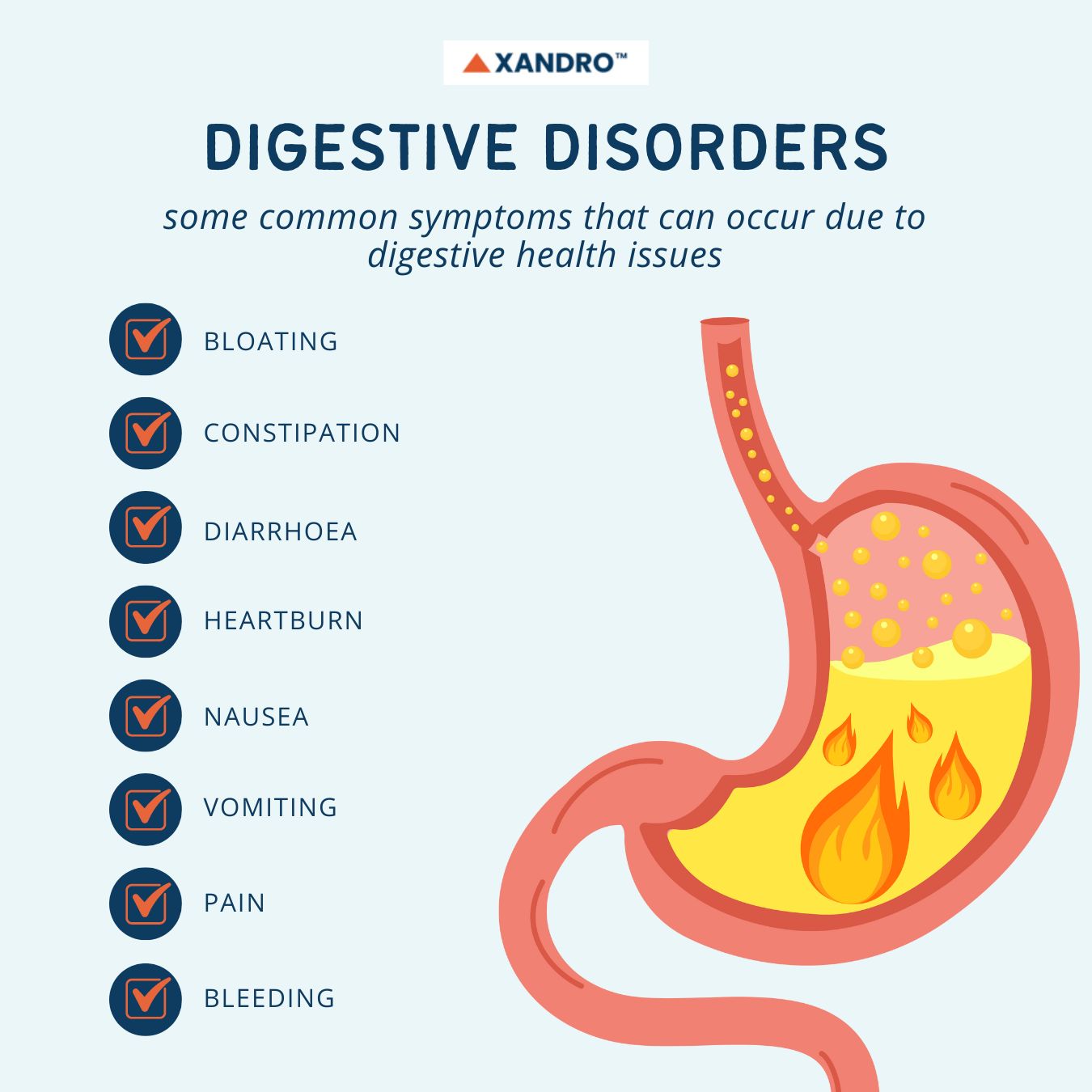
Structural Gastrointestinal Diseases
These occur when your bowel looks abnormal when examined and doesn’t work properly and may need to be surgically fixed to remove the structural abnormality. These can include anal fissures, perianal abscesses, anal fistula, diverticular disease, strictures and stenosis, along with:
Constipation
Where your body finds it hard to pass stools, the stools are infrequent or are incomplete. This often occurs due to not having enough fibre in your diet or from your routine or diet changing. It causes you to strain during bowel movements and sometimes can give you fissures or haemorrhoids, but it’s rarely a sign of a serious medical condition.
Constipation can be treated by adding more fibre and water to your diet, exercising regularly and going to the toilet when you have the urge, rather than resisting. Laxatives can also be useful if these methods don’t work.
Irritable Bowel Syndrome (IBS)
This is where your intestinal muscles contract more or less than ‘normal’ and is sometimes, but not always, caused by certain foods, medicines and emotional stress. Symptoms of IBS can include excess gas, bloating, abdominal pain and cramps, harder, looser or more urgent stools, constipation and diarrhoea.
IBS can be treated by limiting coffee, adding more fibre to your diet, monitoring and then avoiding trigger foods, minimising stress, taking prescribed medications, staying hydrated and getting quality sleep.
Haemorrhoids
These are dilated veins in your anal canal caused by constant excess pressure from straining during bowel movements, pregnancy or constant diarrhoea.
Internal haemorrhoids are blood vessels on the inside of your anal opening that can become irritated and start to bleed due to falling down in the anus from straining. They can fall down to sink or stick out of your anus. To treat them, improve your bowel habits by avoiding constipation and not straining, using ligating bands to remove the vessels or by having them surgically removed.
External haemorrhoids are veins that are just under the skin on the outside of the anus that can burst after straining, causing a very painful blood clot under the skin called a pile. This can be treated by removing the clot and vein or removing the haemorrhoid.
Colon polyps and colon cancer
Colon cancer usually begins as a polyp; a benign growth in the tissue lining your colon and rectum, which then grows and starts to develop abnormal cells that invade the surrounding tissue. If the polyp is removed early enough, it can prevent it from becoming cancer, so a regular colonoscopy is essential to prevent colon cancer, especially since early forms of colon cancer do not cause symptoms. If not, colon cancer can spread throughout the body.
Symptoms can include blood in your stool, a change in bowel habits, narrow stool, abdominal pain, weight loss and constant tiredness.
Crohn’s Disease
A common form of inflammatory bowel disease that causes your digestive tract to become swollen and irritated and gives you symptoms like abdominal pain, diarrhoea, weight loss and rectal bleeding. Crohn’s disease can also cause arthritis, rashes, eye inflammation, kidney stones and osteoporosis. It cannot be cured.
Crohn’s disease can affect any part of your digestive tract and includes ileocolitis, colitis, ileitis, gastroduodenal, jejunitis and perianal disease. There’s no single cause of Crohn’s disease but it generally occurs from a dysfunctional immune system, attacking your body’s own cells.
Further Reading:Supplements for Immune Function and Protection from Age-Related Illnesses
Coeliac Disease
This is a digestive immune disorder that damages the small intestine and is triggered by foods that contain gluten. Coeliac disease can cause lifelong digestive problems and can cause you to not get all the nutrients you need. Symptoms can vary and occur more in children than adults but include bloating, constipation, gas and diarrhoea. Those with coeliac disease will need to remove gluten from their diet to remove symptoms and heal the damage to their small intestine.
Lactose Intolerance
This is when you experience diarrhea, bloating and gas after consuming lactose. It’s caused by lactose malabsorption, where your small intestine makes low levels of lactase and can’t digest lactose. Lactose intolerance can prevent you from getting enough calcium and vitamin D as you generally cut foods that contain lactose out. Some people may only need to limit lactose foods, while others may need to avoid them altogether.
Gastroesophageal Reflux
This is when your stomach contents come back up into your oesophagus, with gastroesophageal reflux disease a more severe and long-lasting condition. It can cause heartburn and regurgitation and may be treated by taking medications and by changing your lifestyle. You may be recommended to lose weight, avoid food and drinks that make your symptoms worse and to eat meals two to three hours before you lie down.
Other than these conditions, we can also get infected with intestinal parasites. If left untreated, these can lead to serious illness, so when travelling to regions with known parasitic infections, make sure to monitor your hygiene and sanitation (of both water and food). You can also develop a parasitic infection when your immune system is compromised.
Your daily gut health can be improved through lifestyle changes, such as eating a high-fibre diet with fruits, vegetables, whole grains, nuts and legumes, regularly exercising, getting both quality and enough sleep, as well as by reducing stress levels.
Many factors can upset your gut, such as
- Eating a low-fibre diet
- Not exercising enough
- Changes in routine, such as travelling
- Eating excessive dairy products
- Stress
- Pregnancy
- Resisting bowel movements
- Overusing anti-diarrheal medications
- Taking certain antacids and medications, such as anti-depressants and iron supplements
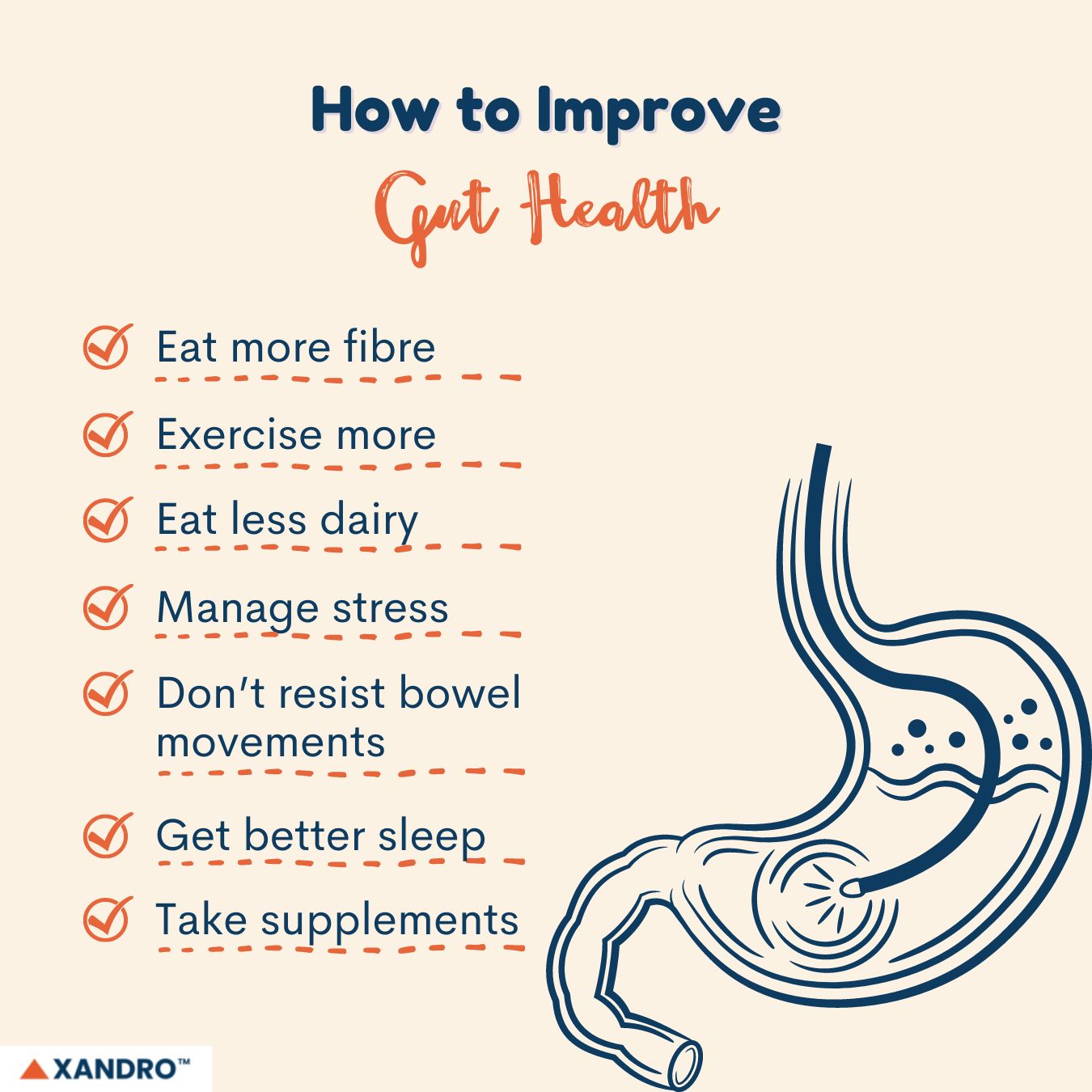
We can also get digestive health support through supplements. This should not be your first point of call when you notice you’re having digestive issues, but alongside changing your lifestyle, supplements can be an extra help.
Our metabolism is the process where our body breaks down food and nutrients for energy and to support various functions.
As we age, our metabolisms slow down, but there are a range of vitamins and minerals that help boost our metabolisms to help us burn calories faster, helping us not put on as much weight.
B vitamins
If you’re deficient in one of the B vitamins, this can affect the others, disrupting your metabolism.
For example, B12 (cobalamin) needs B6 (pyridoxine) and B9 (folate) to metabolise proteins and fats. B6 and B1 (thiamine) also help metabolise protein, fat and carbohydrates, while B3 (niacin) is needed for many digestive tract functions, such as breaking down carbs, fats and alcohol. B7 (biotin) is also needed for breaking down carbs, proteins and fats and keeping our intestinal lining healthy, so make sure to eat plenty of foods that contain B vitamins.
These include lean meats, seafood, dairy products, eggs, whole grains, fruits like bananas and apples, vegetables like potatoes and spinach and nuts and seeds.
Since B12 is only found in animal products and fortified products, vegetarians and vegans should opt for supplements.
Vitamin D
Vitamin D may have anti-inflammatory properties in our digestive tract and may help regulate balance in the gastrointestinal wall, but most of these studies were conducted on animals, so more research is needed to determine if a vitamin D supplement will help our digestive health. Adequate levels of vitamin D have been linked with a reduced risk of colon cancer and it may help decrease the risk of developing an inflammatory bowel disease by supporting our immune function.
Vitamin D also helps our bodies absorb calcium, and is needed for nerve, muscle and immune system function. Some research suggests vitamin D may help those with obesity and may help control blood sugar and improve insulin resistance in those with diabetes, but more is needed.
If you have an inflammatory bowel disease, you may need a vitamin D supplement.
Vitamin D is found in egg yolks, some mushrooms, fatty fish like salmon, sardines and mackerel, beef liver and fortified foods, as well as from sun exposure. The upper limit is 4,000IU per day, with the recommended dosage being 600IU daily and 800IU for those over 70.
Vitamin C
Vitamin C may increase our production of short-chain fatty acids that help in the gut-brain connection and help protect the intestinal barrier. It may help increase good bacteria and decrease bad bacteria, which may help those with inflammatory bowel diseases, such as Crohn’s disease and ulcerative colitis.
It’s an antioxidant, and while important for our immune system (so, our gut), it’s also needed to help with digestion, supporting healthy gums and teeth, as well as helping the body absorb iron.
It’s naturally found in citrus fruits and cruciferous vegetables, such as broccoli and cabbage. The upper limit of vitamin C is 2,000mg per day, although the recommended dosage is 90mg for men and 75mg for women. Not enough vitamin C can result in fatigue, malaise and scurvy, with too much possibly causing digestive issues like nausea, diarrhoea and acid reflux.
Iron
Iron is needed to carry oxygen in our red blood cells, which carry oxygen to and from muscles and tissue. If our iron is low, our muscles may not get enough oxygen, which means we cannot burn fat for fuel properly, and it stops us from having a sufficient metabolism.
Iron is found in meat, beans, brown rice, dark green, leafy vegetables, tofu, nuts and fortified cereals.
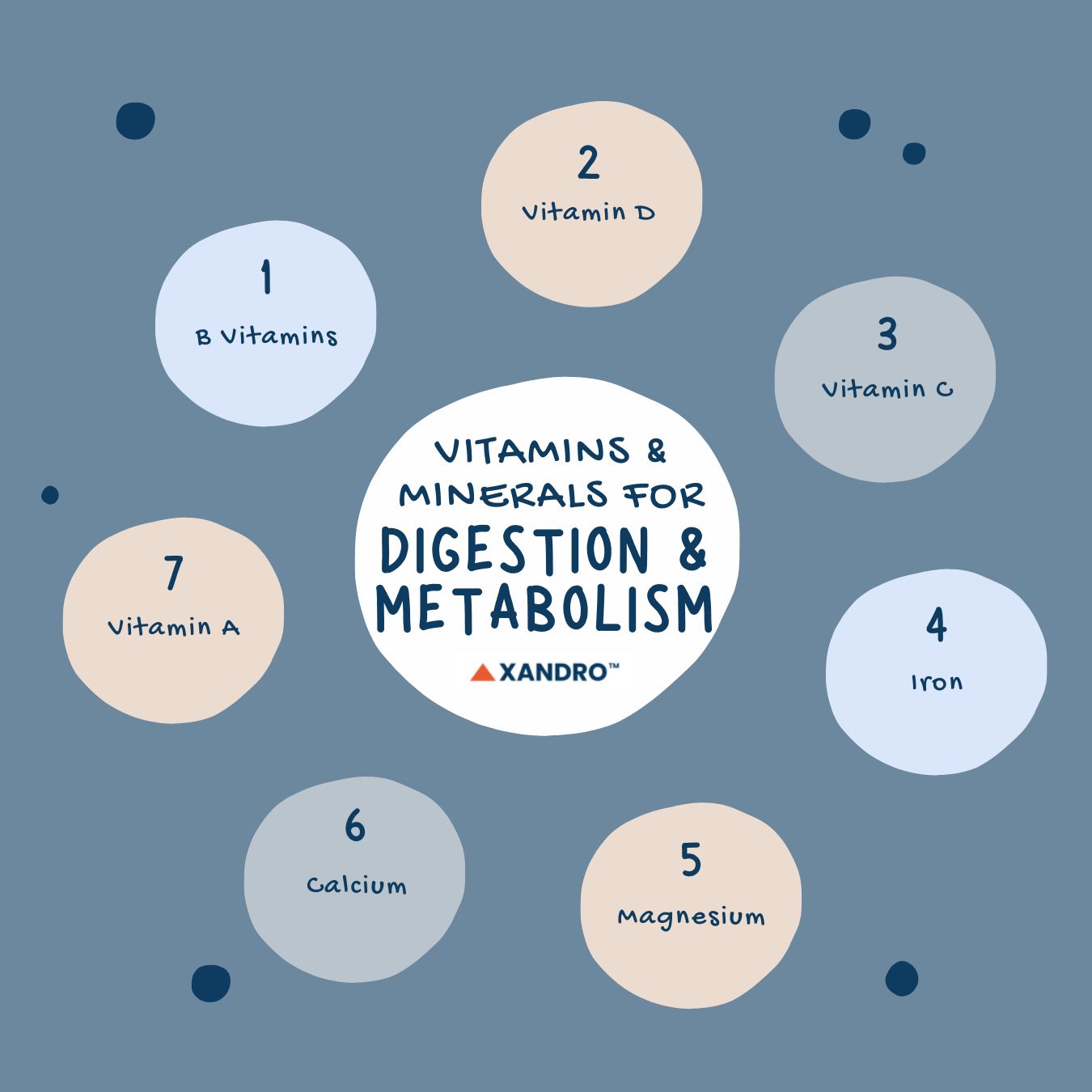
Magnesium
Magnesium is essential for metabolism and energy production as it’s responsible for various chemical reactions in our body. It’s involved in activating our digestive enzymes that break down food and, in our gut, is needed for the contractions that move food through the digestive tract. If we’re low in magnesium, these can be disrupted, leading to irregular bowel movements, bloating and constipation. When we’re low in magnesium, the diversity of bacteria in our gut can also become unbalanced, which can disrupt digestion, nutrient absorption and gut health, which may lead to IBS and inflammatory bowel disease.
Magnesium is found in foods like legumes, nuts, seeds, bananas, potatoes, whole grains and salmon.
Learn more about the scientific-backed benefits of Magnesium!
Check out Xandro Lab’s Magnesium Glycinate supplement, a highly bioavailable form of magnesium to boost your levels faster.
Calcium
Calcium may be necessary for a healthy metabolism, even assisting (when combined with vitamin D, with diet-related weight loss. It’s best to consume calcium through our diet, such as through milk, yoghurt, dark green, leafy vegetables, seeds, almonds and fortified foods.
Vitamin A
Vitamin A is not directly involved with digestion, but it’s important to know that if you have a gastrointestinal disease, such as Crohn’s disease and coeliac disease, you may be vulnerable to a vitamin A deficiency. Stay within the daily limits of vitamin A, being 900mcg for men and 700mcg for women, with toxicity levels occurring over 3,000mcg per day.
Vitamin A is found in foods like herring, salmon, beef liver, green leafy vegetables, carrots, broccoli and sweet potatoes.
Remember, these vitamins and minerals are needed to boost our metabolism and digestion, but that doesn’t necessarily mean supplements are required. Our daily diet should consist of the foods that these are found in, with supplements meant to supplement our diet, especially during those times when we may not be eating as we should be, such as if we were travelling, fasting, unwell or too busy to eat.
Learn more about vitamins and minerals, their recommended dosages and which foods they’re found in, in this post!
As mentioned above, there is a range of foods that promote digestion and may help you avoid common gastrointestinal problems.
But what is the best food for digestive problems?
Well, some of these include:
- Whole grains: Optimal colon function needs at least 25g of fibre, with whole grains providing plenty, so it might be time to switch white bread with whole grain.
- Leafy greens and dark green vegetables: These are an excellent source of fibre, along with plenty of other nutrients too. These include kale, spinach, collard greens, cabbage, watercress, fennel, bok choy, broccoli and Brussels sprouts.
- Lean protein: High-fat foods can trigger contractions of the colon, so fill your diet with lean protein, such as white fish, plain Greek yoghurt, beans, peas and lentils, while poultry, tofu, pork loin, shrimp and egg whites.
- Salmon: High in omega-3 fatty acids which may reduce inflammation in your gut and improve digestion.
- Low-fructose fruits: Berries, bananas, papaya and citrus fruits contain less fructose and make them easier to tolerate, making them less likely to give you gas.
- Avocado: Low in fructose, packed with fibre and other essential nutrients.
- Beetroot: A great source of fibre that can be eaten as is or made into pickles or smoothies.
- Kefir: A cultured dairy product that aids the digestion of lactose and can improve gut bacteria.
- Fermented foods: These can improve digestive health and are full of probiotics, and include kombucha, tempeh, kimchi, sauerkraut, miso and natto.
- Chia seeds: A great source of fibre and which works like a probiotic.
- Bone broth: The amino acids, glutamine and glycine, from the bones, can bind to fluid in your digestive tract and help food pass more easily.
- Ginger and peppermint: Peppermint oil contains menthol that may ease symptoms of IBS and may have a relaxing effect on the muscles of your digestive tract, while ginger may help move food from your stomach to your small intestine quicker, reducing stomach pain and heartburn.
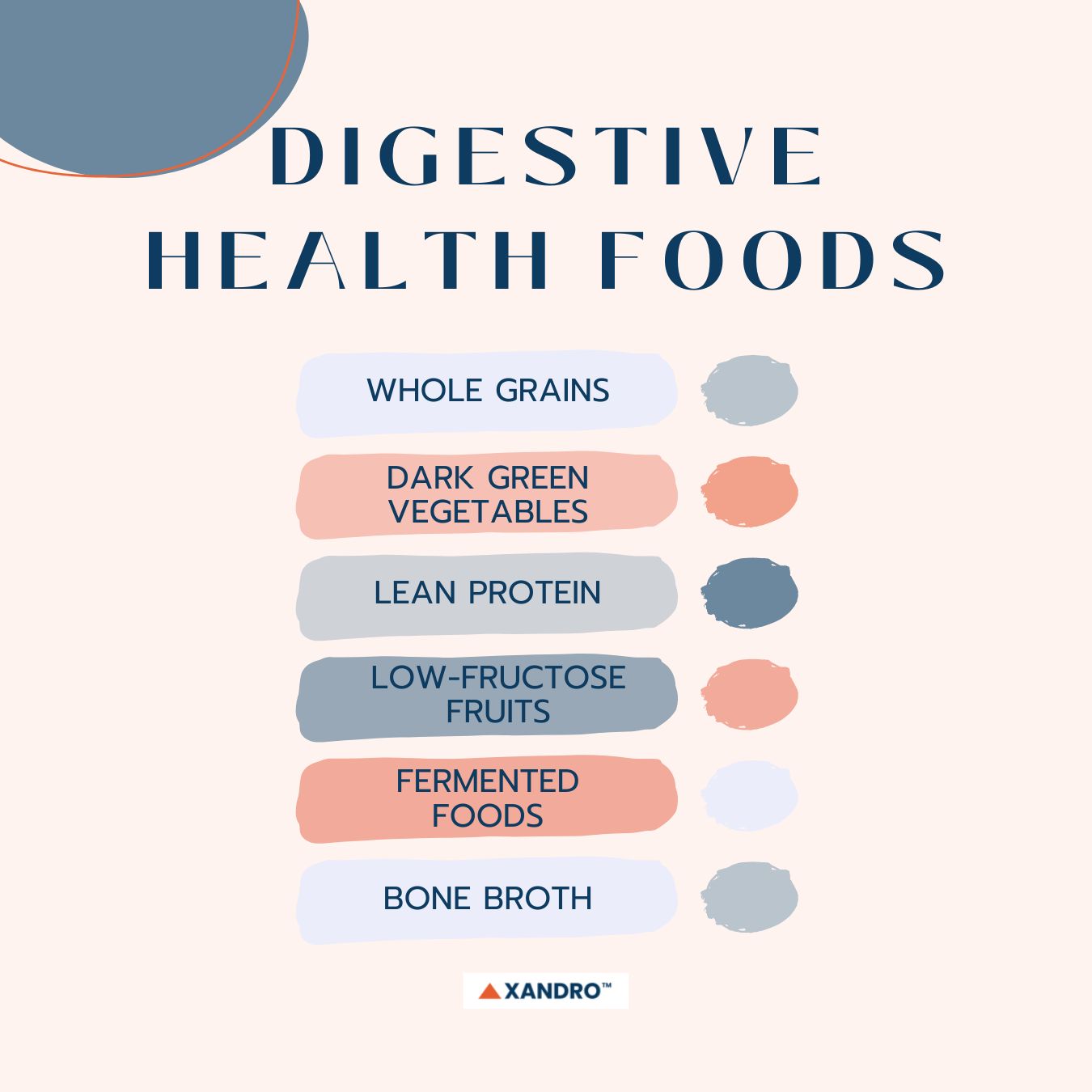
Consider adding more of these foods to your diet to help you naturally seek relief from your digestive issues and if you want a bit of extra help, it might be handy supplementing your diet with digestive health medicine and supplements.
When looking for a digestive health supplement, think about what you’re taking it for and whether it may help your specific symptoms. Don’t just take whatever is on this list, do your research to determine if what you take is right for you, and if you need help, have a chat with your doctor. They know your medical history and can help inform you of any interactions that might occur with your specific condition or any medications you’re taking.
Probiotics
A digestive health probiotic contains living organisms like bacteria and yeast that act as good bacteria for our gut. Our gut microbiome contains both good and bad bacteria that, when balanced, ensure we’re healthy and our bodies are functioning as they should. When we have an abundance of bad gut bacteria over good bacteria, we will generally experience issues, such as a bad immune system. Probiotics help keep our digestive tract healthy, supporting digestive enzymes.
Further Reading: Top 10 Ways to Boost Your Immune System
Probiotics can be taken to fix this imbalance of gut bacteria, as well as to treat certain GI problems, or simply to benefit our gut health. Probiotics can help to enhance our nutrient absorption, support our immune system and protect our gut’s protective barrier.
They also may help manage irritable bowel syndrome (IBS), inflammatory bowel disease and antibiotic-associated diarrhoea as well as help with bloating, gas and digestive discomfort, and they’re also a possible supplement for stomach acid. Since the gut and brain are connected through the gut-brain axis, probiotics may also positively impact mood, stress levels and cognitive function.
Probiotics are one of the best gut health supplements for women. If taking probiotics, make sure they contain Lactobacillus and Bifidobacterium, as these two also have longevity benefits.
Naturally, probiotics can be found in Greek yoghurt, kombucha and kimchi, but can be taken as supplements through tablets, capsules and powders.
Prebiotics
While probiotics are live microorganisms, prebiotics are fibres that our body cannot digest which our gut bacteria use as fuel to grow in our gut. They can be found in most fruits and vegetables, so incorporating plenty of fresh produce in your diet is incredibly important for the gut, but they come as supplements, too.
Liquorice
While it’s long been used to treat indigestion symptoms, such as heartburn and acid reflux, these aren’t backed by scientific evidence and eating liquorice pure can have side effects. A specific extract of liquorice, DGL, has a certain chemical removed which means it doesn’t have as many side effects. Pregnant women should not take DGL.
Pomegranate
Pomegranate may help our gut microbiome by increasing the levels of good gut bacteria — it acts like a prebiotic. It’s also high in fibre, which is essential for digestive health. Resveratrol, also found in pomegranates, may also help regulate our gut bacteria by enhancing the growth of good bacteria and preventing the growth of pathogenic ones.
Learn more about pomegranate supplements and their wide range of health benefits, and if you want to experience these, be sure to try out Xandro Lab’s POM-Q10!
Peppermint Oil
Peppermint oil might be one of the best supplements for digestion and bloating. It may reduce pain and bloating from IBS. Just make sure you take enteric-coated capsules so they don’t dissolve in your stomach, rather, they move to your small and large intestines where the oil is then released. Only take it in small doses.
Chamomile
Potentially has benefits for digestive problems like an upset stomach and nausea, as well as anxiety and insomnia. Remember, not all natural gut health supplements are beneficial and even suit everyone. For example, if you have a plant allergy, such as to ragweed, you may have an allergic reaction to chamomile.
Ginger
It’s been suggested that drinking ginger juice short-term may help our gut microbiota, giving our gut greater diversity in bacteria. Used to treat stomachaches and relieve nausea and vomiting during pregnancy. It’s safe to take 1 to 2 grams per day.
L-Glutamine
Glutamine is a naturally occurring compound in your body, supporting your intestines and other organs. It may help people better absorb other nutrients, especially for those with too much bad bacteria in their digestive tract, those who take cancer drugs and those who have had some of their intestines removed. It may also help relieve diarrhoea caused by surgery, infections and stress.
More research is still needed, but some studies suggest it may support the gut microbiome, regulate inflammatory responses and help the gut mucosal wall. Another study found it helped improve irritable bowel syndrome symptoms, such as bloating and abdominal pain.
Further Readings: Supplements to Improve Appetite and Digestion
Psyllium Husk
This is used in certain laxatives due to its high fibre content and its ability to absorb water into the intestines — this makes our stool bulky and easier to pass through, helping if you have diarrhoea. If you’re allergic to grass pollen, English plantain pollen or melon, you could have a serious allergic reaction when taking psyllium.
Artichoke
The extract from artichoke leaves may help relieve indigestion symptoms and, on a daily, may help lessen nausea, vomiting, abdominal pain and gas. Artichoke extract has no known interaction with drugs but may cause allergic reactions in those who are allergic to ragweed and related pollens.
Curcumin
Curcumin is known to be one of the best supplements for gut health and inflammation, but contains a range of other health benefits, too. Read more here. The main compound in turmeric, curcumin has antioxidant and anti-inflammatory properties. Some research has found it may help our good bacteria strains, but research on this is mixed.
Try out Xandro Lab’s Turmeric Curcumin, a highly absorbable form of curcumin, to see if you experience the benefits!
Butyrate
This short-chain fatty acid may feel and support the cells lining our colon. It’s naturally made when our gut breaks down fibre, but it’s also found as a supplement. Keep in mind that clinical studies on supplementing with butyrate in humans currently have mixed results.
Apple Cider Vinegar
This is a fermented juice made from apples. Apple cider vinegar contains pectin, which is considered a prebiotic. There are no strong scientific studies in humans that show apple cider vinegar’s benefits for gut health, so keep that in mind.
Further Reading: Do Supplements Cause Stomach Aches?
We can’t have a guide to digestive health and supplements without talking about the supplements that you shouldn’t take for gut health or that actually cause stomach pain.
First of how, how do you avoid an upset stomach after taking supplements?
This can differ from supplement to supplement, but generally:
- To begin with, take vitamins and supplements with food or water to allow your body to get used to the supplement before you begin to take a specific one on an empty stomach (if that has benefits).
- Reduce the dosage of your supplement, then slowly build your way up to the optimal dosage once your body adjusts, about two weeks. You can even split some supplements, taking half in the morning and the other half in the evening.
- Unless it’s a dedicated sports supplement (read more here), don’t take supplements before exercising.
As for which supplements may cause stomach pain, or may cause you discomfort if you don’t take them properly, here are some to keep in mind.
- Iron: Despite absorbing better on an empty stomach, iron may cause stomach upset if you take it without taking it with food. Taking more than 45mg per day (the upper limit) has been linked with stomach issues. Men need 8mg per day while women need 18mg (27mg when pregnant).
- Magnesium: Not all forms of magnesium are the same. When browsing the stores, you will often find magnesium oxide (as it’s cheap), but this is actually a laxative and is likely to cause diarrhoea and stomach cramps. If you need to increase your magnesium levels, opt for a gentle form of magnesium, such as magnesium glycinate or malate, which are highly absorbable but gentle on the stomach.
- Zinc: Some zinc forms can give you stomach pain due to your low levels of stomach acid when it’s recommended to take it (one hour before or two hours after meals). Consider taking zinc bisglycinate or lower your dosage.
- Calcium: High levels of calcium can lead to stomach pain, nausea and diarrhoea, so only take about 500mg of magnesium at a time.
- Vitamin C: Taking more than 2,000mg of vitamin C per day may cause stomach pain, vomiting, nausea and diarrhoea.
- Multivitamins: Some multivitamins can cause side effects when taken on an empty stomach due to some of the minerals inside, so try taking them with food.
How to improve digestion naturally at home?
To improve your digestion naturally at home, pack your diet with fruits and vegetables as well as nuts and whole grains, which are high in fibre. Eat foods with probiotics and limit your processed foods, sugars and red meats. When eating, be mindful to chew your food thoroughly to help it pass and drink plenty of water. Also, exercise regularly, try to limit stress and maintain a healthy weight.
How to keep stomach healthy and clean?
To get a healthy and clean stomach, eat foods high in both soluble and insoluble fibres to draw in water into your gut and add bulk to your stools. Add probiotics to your diet, whether that be through the foods you eat or through supplements, to help increase the healthy bacteria in your gut, which can protect against IBS, help with nutrient absorption and strengthen your immune system. Make sure to drink plenty of water to maintain the water balance in your body, especially since fibre takes a lot of water from your body.
How to increase digestion speed?
To increase your digestion speed, make sure to eat regularly and eat appropriate portion sizes when you do (this depends on your age, sex, body size, metabolism, hunger and fullness levels and activity. Also, in saying that, make sure you eat enough, as not eating enough can actually slow your digestion and metabolism as your body adapts to less food. Make sure the meals you eat are balanced and you get enough high fibre foods in your diet, and then incorporate regular exercise each day to help you digest your food. Also, drink plenty of water throughout the day.
You can also take probiotic supplements to speed up digestion, especially if you don’t get enough probiotics in your diet, as well as drink plenty of bone broth and drink certain teas, such as fennel tea and dandelion tea, which can sometimes help get your system going.
End Note
While supplements can be incredibly beneficial when trying to improve our digestive health, it’s always important first to fix our lifestyles. Eat a healthy and balanced diet with plenty of fruits and vegetables, exercise regularly, go to bed earlier to get plenty of restful sleep and try to reduce your stress levels.
Before adding any supplements to your daily routine, make sure to speak with your medical professional or digestive health specialist so that they can determine what and if any are beneficial for you.
